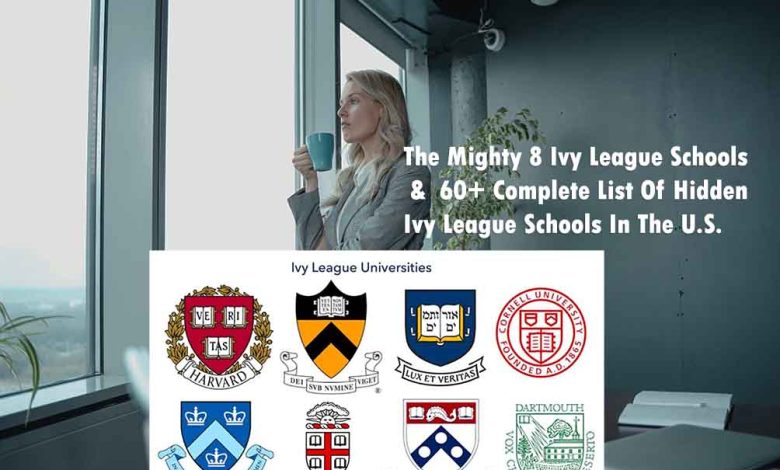The Mighty 8 Ivy League Schools & 60+ Complete List Of Hidden Ivy League Schools In The U.S.
Exploring Academic Excellence: Explore the Prestigious Hidden Ivy League Schools

The Mighty 8 Ivy League Schools & 60+ Complete List Of Hidden Ivy League Schools In The U.S.
A distinct set of universities, the Ivy League is renowned for its demanding academic standards, intense athletic programs, and exclusive admissions procedures.
These colleges are regarded as some of the most esteemed and historically significant in the United States.
The Northeastern region of the United States is home to eight of the world’s most esteemed private colleges, generally referred to as the Ivy League.
Are you hoping to get into one of the best universities in the United States? Then you should be familiar with the IVY league universities.
What are the IVY League Schools?
Universities of the Ivy League are universities that have a reputation for their challenging academic standards, extensive undergraduate curriculum, and competitive sports programs.
Enrollment in Ivy League schools is regarded as a significant achievement in and of itself since these schools are frequently linked to high standards of academic performance.
Ivy League universities have long been recognized for their dedication to academic quality, and their alumni are renowned for their remarkable intellectual ability and leadership qualities.
The Ivy League universities have played an important role in establishing the American educational system, graduating a lengthy list of distinguished individuals, including US presidents, Nobel laureates, and business executives.
The Ivy League schools were created during the colonial era of the United States, with Harvard University being the oldest, established in 1636.
You should also take into account those schools that go by the name of “Hidden Ivies.
We’ll take you through all the information you require on these universities, such as their definition, and a comprehensive list of Hidden Ivy colleges.
Hidden Ivies
The phrase “Hidden Ivies” was first used by experts Howard and Matthew Greene in their book of the same name published in 2000.
The eight Ivy League schools are well-known for their illustrious alumni, status, and brand awareness. The Ivy League and Hidden Ivies are comparable in terms of selectivity and liberal arts programs offered.
When the Ivy League was first established, intellectual excellence had little bearing on it. At first, it was a sports league founded by Division 1 of the National Collegiate Athletic Association (NCAA) in 1954.
These days, these institutions are associated with being extremely selective and academically demanding. Almost Ivy League schools, or hidden Ivies, are universities that have some characteristics in common with Ivy League universities.
The Mighty 8 IvyLeague schools
- Harvard_University – Location – Cambridge, Massachusetts.
- Princeton University – Location – Princeton, New Jersey.
- Yale University – Location –New Haven, Connecticut
- Columbia University – Location – New York City
- Cornell University – Location – Ithaca, New York.
- Dartmouth College – Location – Hanover, New Hampshire.
- Brown University – Location – Providence, Rhode Island.
- University of Pennsylvania – Location – Pennsylvania
Complete List Of 60+ Hidden Ivy League Schools
Numerous universities are referred to as “Hidden Ivies.” Even though some of these universities are very tiny, they provide a thorough liberal arts education that is on par with that of the top universities in the country.
- University of Chicago
- University of Notre Dame
- University of Richmond
- University of Rochester
- University of Southern California
- University of the South
- Wesleyan University
- Brandeis University
- Bucknell University
- Case Western Reserve University
- Colgate University
- Denison University
- Duke University
- Emory University
- Fordham University
- Georgetown University
- Johns Hopkins University
- Lehigh University
- Northwestern University
- Rice University
- Southern Methodist University
- Stanford University
- Tufts University
- Tulane University
- Vanderbilt University
- Villanova University
- Wake Forest University
- Washington and Lee University
- Washington University in St. Louis
- College of the Holy Cross
- Amherst College
- Barnard College
- Bates College
- Boston College
- Bowdoin College
- Bryn Mawr College
- Carleton College
- Colby College
- Colorado College
- Davidson College
- Dickinson College
- Grinnell College
- Hamilton College
- Haverford College
- Oberlin College
- Pomona College
- Reed College
- Claremont McKenna College
- Franklin and Marshall College
- Middlebury College
- Mount Holyoke College
- Kenyon College
- Lafayette College
- Macalester College
- Skidmore College
- Smith College
- Trinity College
- Vassar College
- Wellesley College
- Williams College
- Swarthmore College
- Union College
Benefits of Hidden Ivy League Schools
Excellent Education
An “Ivy” institution is dedicated to the intellectual achievement and exploration of its students, emphasizing a liberal arts education.
Many educational institutions strive to provide students with leadership skills so they may improve their communities, nations, and the entire world.
You may be certain of a well-rounded education and a diverse curriculum if you attend a Hidden Ivy School. According to Howard and Matthew Greene, graduates who pursue a liberal arts education should be able to:
- Use ordered, logical, cohesive, descriptive, and rich language to express thoughts and feelings, both orally and in writing.
- Have the ability and instinct to work cooperatively and collaboratively with others in one’s professional and community life.
- Think creatively and take risks when solving problems.
- Develop the capacity to define goals using relevant information and study, and then achieve these goals using the right means.
- Help develop a personal value and ethical framework that serves throughout life in making the difficult decisions that one will encounter.
- Analyze, organize, and use data to create meaningful solutions.
Resources Availability
Ivy League schools have numerous services available to students. Assessing a school’s endowment in relation to the size of its student body is an excellent approach to determining its resource availability.
If the college investment and funding are reasonably high in comparison to the number of students enrolled, then that signifies a great sign of an Ivy League school list.
“The wealth of the school concerning the number of undergraduates on campus is in part indicative of the commitment of the Ivies and the Hidden Ivies to undergraduate education,” claim Howard and Matthew Greene.
The Greenes clarify Hidden Ivy resources in this order:
- High-quality libraries
- Extracurricular programs
- Modern scientific research facilities
- Emphasis and access to up-to-date technology
- On-campus housing quality and availability
- Athletic and arts facilities

Faculty with expertise
An elite faculty is one of the characteristics of any Ivy League School. A top-notch education is guaranteed by its outstanding professors.
‘These professors frequently have multiple degrees in their field, have conducted research, and have written books or articles about it.
Undergraduates can take advantage of several chances at any Hidden Ivy university, including:
- Research projects
- Assistantships
- Internships
- Study-abroad programs
An Interdisciplinary Student Body
To improve college life and bring together individuals with different origins, interests, and skill levels, diversity is essential.
The significant impact that peers have on a person’s educational experience was one of the most significant discoveries made from speaking with thousands of undergraduates at prestigious universities.
Diversity is about much more than just color and ethnicity, even if it is crucial. A more diverse college experience is produced by additional variables such as socioeconomic position, location, sexual orientation, and political and religious affiliations.
Effective Team for Education and Leadership
At the vanguard of Hidden Ivies are outstanding, seasoned leadership teams with significant academic preparation and a high level of education.
Additionally, each college’s mission and goals are reinforced by their supervision.
The history and core values of a college can be inferred from how well its mission is carried out. Elite universities know exactly where they want to go and how they want to get there.
Outstanding Results and Return on Investment
At these colleges, quantitative results like graduation and retention rates are frequently really good.
To account for significant changes, retaking coursework, taking time off, or other personal reasons, graduation rates are usually measured every five or six years.
Still, new data indicates that a large number of “hidden Ivy” schools have good four-year graduation rates.
How to Get Admission to Hidden Ivy League Schools
Despite not being official members of the Ivy League Schools, some universities have competitive programs.
Due to each school’s selectivity, you need to apply with polish to be considered. The advice that follows will help you increase your chances of being accepted.
Strong Letters of Recommendation
Letters of recommendation offer a new viewpoint on your progress, intelligence, personality, and character. Requesting suggestions as soon as feasible is one approach to guarantee you get quality ones.
Keep in mind that a lot of your peers will be requesting letters of recommendation when application season rolls around.
Think carefully about who you ask for these letters as well. The majority of universities request recommendations from instructors who instruct you in fundamental courses during your junior or senior years.
Select referrers who are well acquainted with you and with whom you have developed a more intimate bond.
Compose Efficient Essays
Your essays form the foundation of your application, as corny as it may sound. These writings demonstrate your writing abilities and provide an overview of your experiences, history, personality, and way of living.
Writing a minimum of one personal essay through the Coalition Application or the Common Application is required.
Additional essays, which offer more targeted questions about your motivations for wanting to attend the school and your plans to contribute to its culture, are required by several colleges.
Make sure you take the time to generate ideas and create vivid stories that draw in readers.
Recall that great supplemental essays build upon your application, present fresh facts, and allow your individuality to be shown. They don’t have to be about some amazing experience.
Emphasize Your Community Service and Extracurricular Interests
Your involvement in extracurricular activities and volunteer work demonstrates your interests, time management skills, and community service accomplishments.
Make sure you’re participating in extracurricular activities or community service initiatives because you want to, not just because you believe they will “look good” on your college application.
Concentrate on Your Test Results and GPA
A stronger GPA and exceptional test results support any application, although the majority of colleges employ a comprehensive screening procedure.
It can be challenging to aim for a 4.0 GPA, but you should always do your hardest.
Try your hardest in your last classes if you’re a senior and don’t have much time to raise your GPA, but concentrate on improving your SAT or ACT scores instead.
Finding a regular study routine that works for you, understanding your strengths and shortcomings and addressing them appropriately, and making sure you know necessary to achieve higher scores are all necessary to achieving high test results.
Summary
Unveil the academic powerhouses known as the ‘Hidden Ivy League Schools’ with our comprehensive guide to the Mighty 8 and 60+ complete list of schools across the United States.
These institutions, while not officially part of the Ivy League Schools, boast academic excellence, prestigious programs, and opportunities rivaling their Ivy counterparts.
Delve into our curated list to discover these hidden gems, offering students a world-class education and unparalleled opportunities for success.
Whether you’re seeking top-tier academics, robust research opportunities, or a vibrant campus community, these Hidden Ivy League schools provide a pathway to academic excellence and future achievement.
FAQs
Why is it called Ivy League?
The relationship with ivy is most likely due to the popular 19th-century practice of “planting the ivy,” an evergreen plant symbolizing long-term growth, on college and university campuses.
What are the 12 Ivy League schools’ locations?
- Harvard University (Massachusetts)
- Yale University (Connecticut)
- Princeton University (New Jersey)
- Columbia University (New York)
- Brown University (Rhode Island)
- Dartmouth College (New Hampshire)
- University of Pennsylvania (Pennsylvania)
- Cornell University (New York)
Is Oxford an Ivy League school?
Oxford University, a well-known and reputable university in the United Kingdom, is not considered an Ivy League school.
The Ivy League is the collective name for the best eight universities in the United States. The Ivy League consists of Princeton, Columbia, Dartmouth, Brown, Pennsylvania, Cornell, Harvard, and Yale.
Why is MIT, not Ivy League?
Since then, the phrase “Ivy League” has come to represent prestigious American universities and intellectual standing.
Despite being a very esteemed university, MIT does not belong to the Ivy League since it does not play in the same Division I athletic conference as those other colleges.
Is Oxford better than Harvard?
Oxford is known for its research in the natural sciences, social sciences, and humanities, even though it does not have the same level of funding as Harvard.
The university is a great choice for research with a European or global perspective because of its location in Europe and its strong relationships with institutions throughout the continent.













